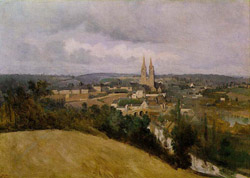Last month, when I met the if:book crew for the first time, Ben described the net-native literary forms that have emerged to date as ‘incunabula’. I didn’t know what the word meant. He explained that, in the Middle Ages, when they first started printing books, there were all kinds of experiments which explored print technologies but hadn’t yet settled into a form that made full use of them. Ben suggested that forms of Web writing today are at an equivalent stage.
The word ‘incunabulum’ stuck with me. There’s something endearlingly fragile and tentative about it, as though Net-based forms of writing were a new species of winged things, freshly-hatched and still a bit soggy and crumpled. Since abandoning the notion of writing for print (paper) publication some time ago, though, I find myself reluctant to reinvent the wheel. So I’m very interested in what is emerging on the Net around the axis of technology and (used here in its classical sense, for want of a better word) poetry.
Top of my list at the moment as the Web’s finest emerging art form is alternate reality gaming. I wrote about that here not long ago; since then, I’ve vanished into a currently-playing ARG and will write more on the experience when I can. Meanwhile, this week I’ve stumbled across an interesting cross-section of Web-based stuff and thought I’d do a roundup here.
Disclaimer time. Ben’s already admirably dissected the problems with the Million Penguins project, so I won’t go into that. I also know there is a whole tranche of early experiments with hypertext writing which I’ve ignored. My reason for doing so is that a) I can’t be exhaustive – that’s what your search engine is for. Also, in my experience, hypertext fiction tends to be somewhat sterile and frustrating, recalling the Choose Your Own Adventure novels I read as a child. That said, if anyone knows of any that buck this trend, please send them my way.
Anyway, incunabula. The first is some years old, and is actually an event rather than a single piece of writing: the delightfully geeky Perl Poetry Contest of 2000. In the words of the Perl Journal that reviewed it:
The Perl Poetry Contest is sort of a kinder, less migraine inducing sibling of the Obfuscation Contest. The Obfuscation Contest promotes the creation of vile looking scripts. The Perl Poetry Contest is the other end of the spectrum, promoting the generation of flowing verse, and Perl, to make something beautiful.
Here’s the winner, by Angie Winterbottom:
if ((light eq dark) && (dark eq light)
&& ($blaze_of_night{moon} == black_hole)
&& ($ravens_wing{bright} == $tin{bright})){
my $love = $you = $sin{darkness} + 1;
};
It’s derived from a verse from the Pandora’s Box album ‘Original Sin’:
If light were dark and dark were light
The moon a black hole in the blaze of night
A raven’s wing as bright as tin
Then you, my love, would be darker than sin.
This is only just within my personal geek:lit frame of reference, as I don’t program Perl. But I include it in memory of the first time I heard a techie use the phrase ‘elegant code’, as I remember how struck I was then by the idea that there could be an aesthetics of machine code. I’d imagined that coding was purely functional and as such more about engineering than art; lately, I’m beginning to suspect that coders play an equivalent role in the online space to the one print authors play/ed in the literary canon. Poetry written in machine code sits elegantly across the literary/aesthetic and technical spaces in a way very suggestive of this accession of coding to the status of meta-literature.
My second incunabulum of the week comes from Everything2, a relatively open-access online writing space (see the Wikipedia entry for more info). The structures of this site merit further examination, particularly in contrast with the Million Penguins fiasco. But in the interests of brevity, for the time being here’s an entry from user “allseeingeye”: a poem about online gaming with the glorious title “im in ur base killin ur d00dz“.
I won’t go into the layers of memetic accretion around this phrase (try Encyclopedia Dramatica or urbandictionary if you really need to know). What enchanted me about the piece is that it uses a mixture of Everything2’s hard links, geek and gaming slang, and relatively traditional free verse to create something in which form and function, tradition and new technologies, “high” and “low” cultures merge most intriguingly. The writer’s genderless username addes extra ambiguity to the elision of gaming and eroticism in a way that’s very evocative of how of heightened emotion plays out in disembodied online spaces.
There’s also something thought-provoking about the fact that Everything2’s hard links are, like Wikipedia, often unfinished. If you click on one and find it incomplete, the page invites you to create an account and then add the page. When you read a poem that’s full of these sometimes-unfinished links, it’s a bit like a reverse version of The Waste Land. The difference is that where Eliot’s piece functions as an accretion of quotations that refer backwards through the history of the canon, this functions as a speculative accretion of things that may become quotations, and refers forwards to a canon not yet created.
Incunabulum number three is Batan City, a MediaWiki-based imaginary city. It was started by Paul Youlten, founder of the site formerly known as Yellowikis, a wiki-based business listings directory that sparked a legal challenge from the yellow pages industry, and now at SocialText. When Paul sent a story to a friend of his, she responded not with a commentary but with another story. The result is starting to accumulate online. There isn’t much there yet, but the convention appears to be that the “city” accumulates individually-authored stories around a central fictional place. I’m very interested in what works and does not work in wiki-based fiction (providing no structure at all, for instance, really doesn’t, as Ben pointed out a few days ago; here we have some basic structure and an invitation first to submit a story and then to spread the word to other writers. I look forward to seeing how it evolves.
Incunabulum number four is Troped, a blog-based ongoing narrative. I came across this when its author commented here in if:book, and have been dropping by there every few days to try and get a feel for what it’s up to. The format is short, not always obviously interrelated stories, usually updated every day or so. I’ll admit I haven’t been following it for long or in depth, but so far what leaps out is not a strong story, but the sense of an experiment in time and form. Individual entries, each with the feel of a mini-short-story, read down the page; but because it’s posted in blog software the chronology of the whole reads in the opposite direction. That is, the first entry in narrative terms is the last you come to in formal terms, but the direction of the entries themselves goes the other way. In addition, the author/s (perhaps unconsciously) echo/es this temporal paradox with a slightly odd use of tenses within the stories (“Jameson laughs. He preferred to just use the shop as a place to dicker around–someplace other than his house“), which adds a layer of temporal confusion. So to date I haven’t got into this one. But as a piece testing the limits and possibilities and mute formal insinuations of net-native writing delivery mechanisms, it’s certainly worth a look.
So, a mixed bag. Perl poetry experiments with the constraints of language, flirting with machine code in a way that subverts the usually functionalist preconceptions that lay non-coders such as myself tend to have about computer languages. The killin ur d00dz piece hard links within its writing community to foreground the dynamic and collaborative emergence of Web-specific jargons, even as it captures the intense experience of one individual. Batan City is a tentative (though, perhaps luckily for its creators, less populated than the Penguin effort) attempt to reconcile open editing with individual authorship of story elements, that uses the twin structures of a fictional place and an alphabetised list to structure the entries it invites. And Troped tests the interrelation between online self-publishing software and narrative temporality.
What all these pieces have in common is a concerted attempt to do more than upload the conventions of print text (boundedness, single authorship, linearity) into an environment that encourages in many ways the inverse of these traditions. They all have limitations, but all are pushing at the boundaries of what the new technologies make possible: multiple or anonymous authoring, new languages, strange temporalities and explicit acknowledgement of the intertext.

 While my main interest was in starting a community, I had other ideas — about making the archive more editable by readers — that I thought would form a separate discussion. But once we started talking I was surprised by how intimately the two were bound together.
While my main interest was in starting a community, I had other ideas — about making the archive more editable by readers — that I thought would form a separate discussion. But once we started talking I was surprised by how intimately the two were bound together. If the Ecclesiastical Proust Archive widens to enable readers to add passages according to their own readings (let’s pretend for the moment that copyright infringement doesn’t exist), to tag passages, add images, add video or music, and so on, it would eventually become a sprawling, unwieldy, and probably unbalanced mess. That is the very nature of an Archive. Fine. But then the original purpose of the project — doing focused literary criticism and a study of narrative — might be lost.
If the Ecclesiastical Proust Archive widens to enable readers to add passages according to their own readings (let’s pretend for the moment that copyright infringement doesn’t exist), to tag passages, add images, add video or music, and so on, it would eventually become a sprawling, unwieldy, and probably unbalanced mess. That is the very nature of an Archive. Fine. But then the original purpose of the project — doing focused literary criticism and a study of narrative — might be lost.